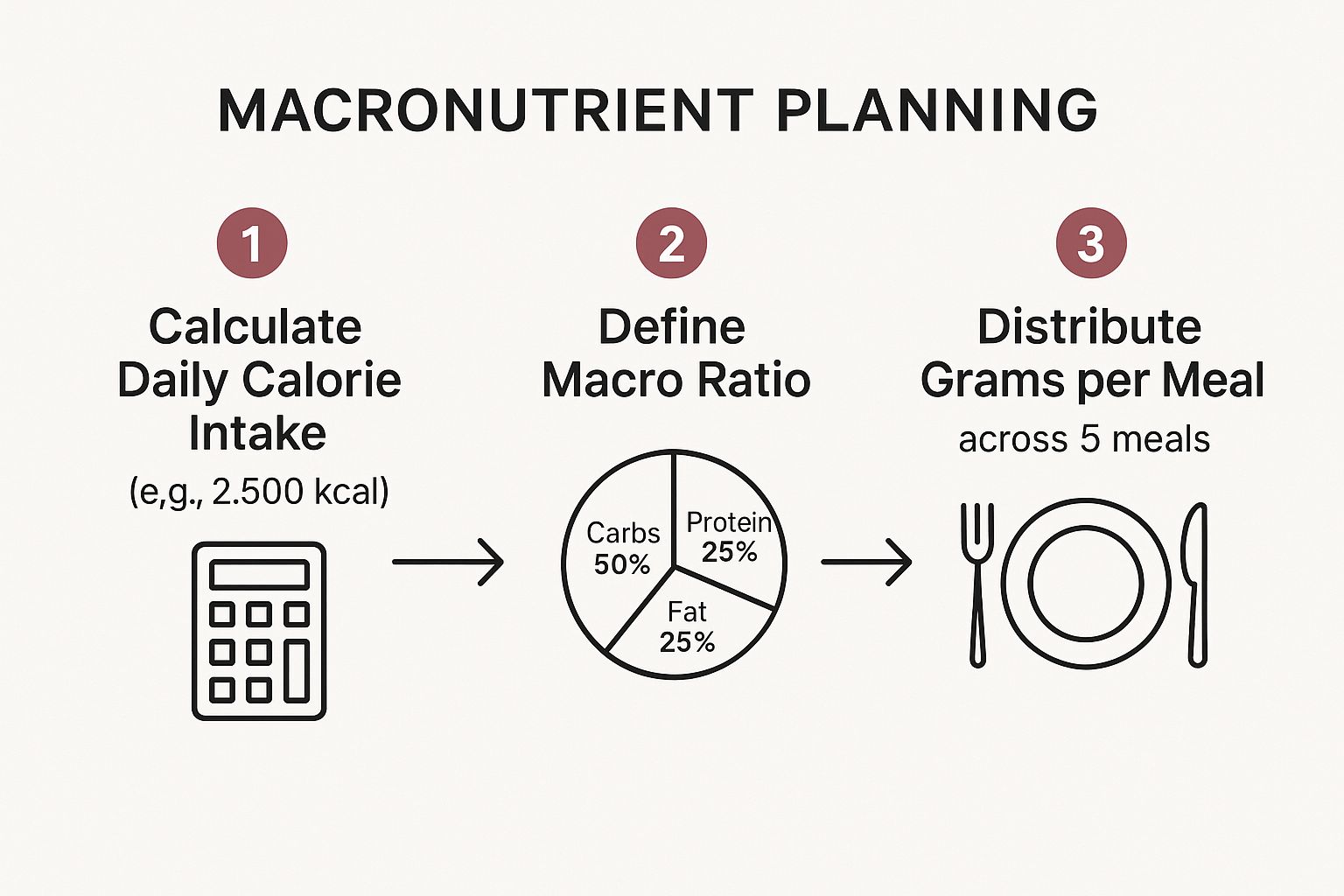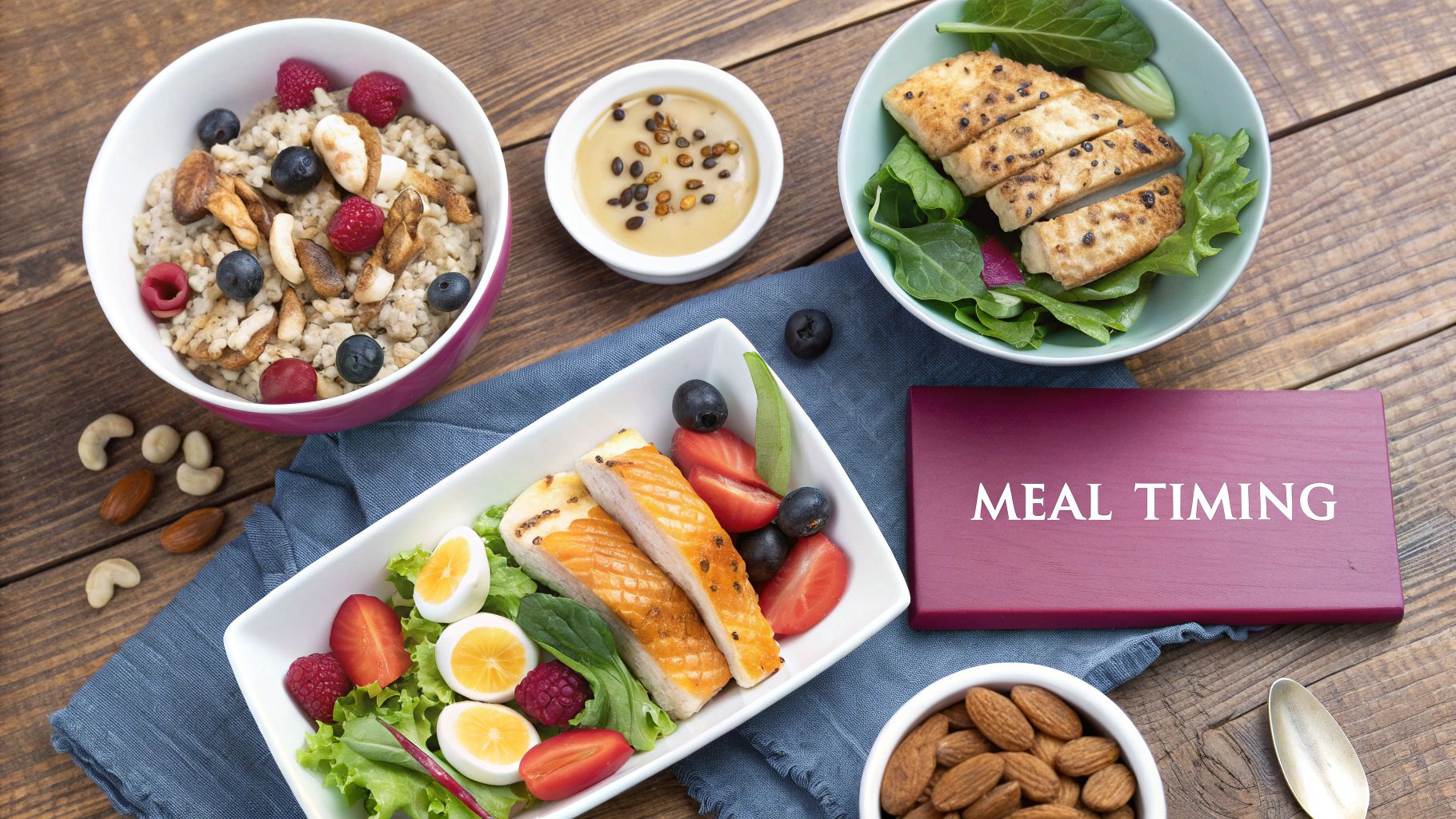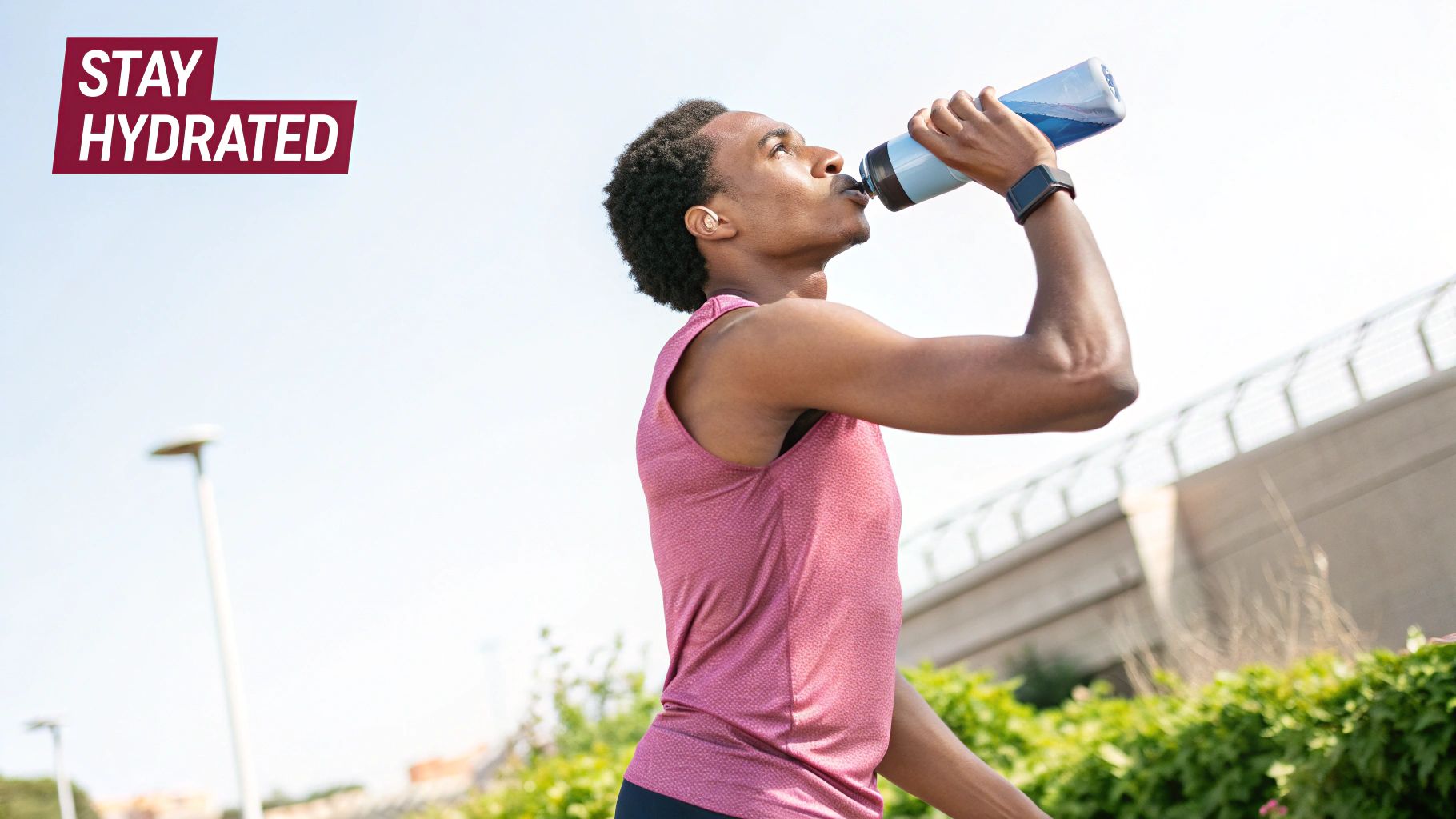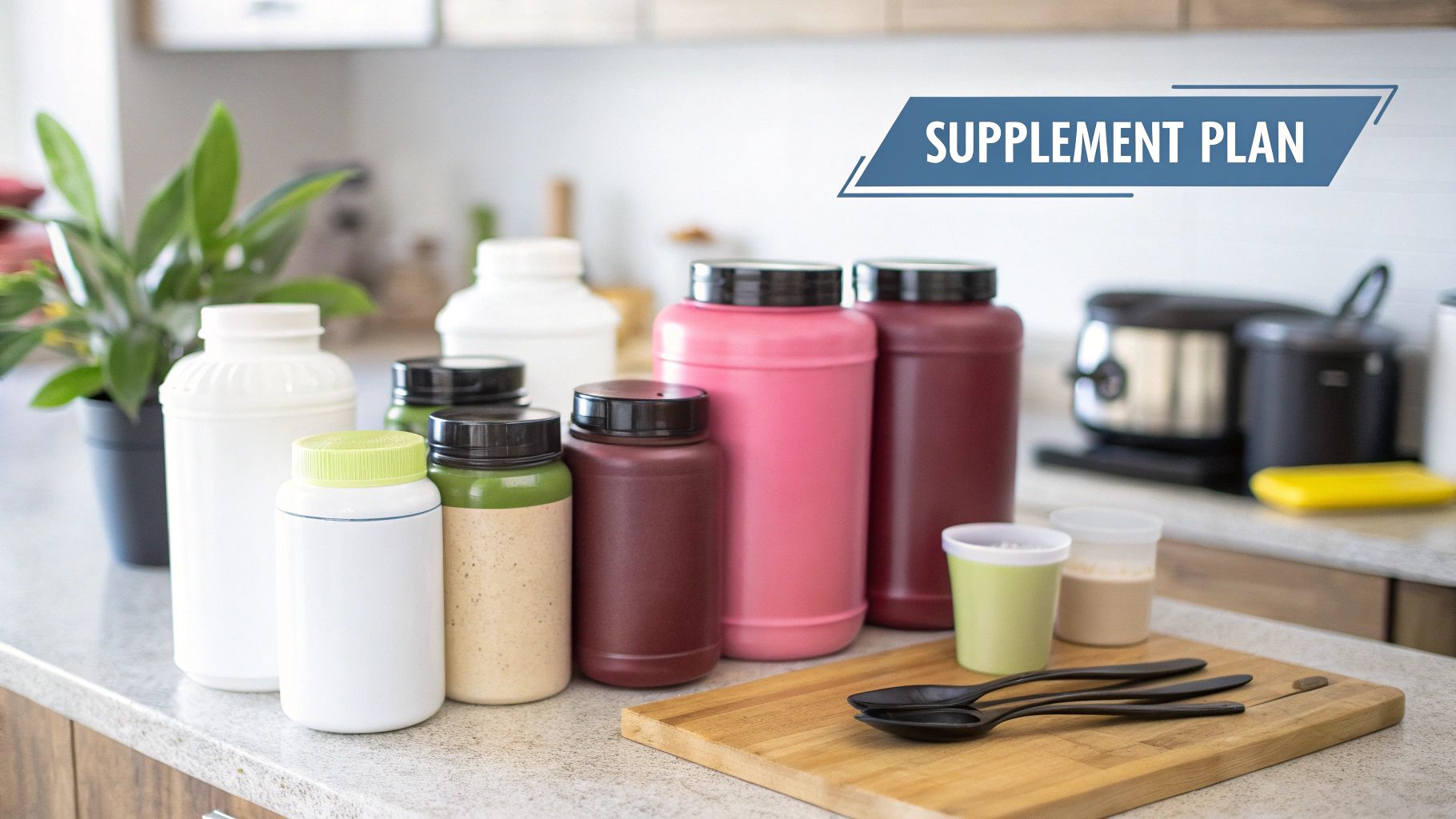Any serious nutrition plan for athletes stands on three pillars: mastering your macros, timing your meals, and getting hydration right. This isn't about following a generic diet; it’s about building a framework that’s fine-tuned to fuel your performance, speed up recovery, and ultimately give you that competitive edge.
We’re moving beyond just “eating healthy” and into eating for a specific, powerful outcome.
Building Your High-Performance Nutrition Foundation
Every top-tier athlete has a secret weapon, and it’s almost always their nutrition plan. It’s the one thing that cuts through all the training noise to deliver real, measurable results. Let's break down the absolute non-negotiables of performance nutrition so you can build a plan that actually works for your body and your sport.
Fuelling your body for success isn’t just about what you put in it, but when. This is the foundational knowledge you need to build a truly personalised plan that can handle your specific training demands, whether you’re playing for a local club or competing on the world stage.
The Three Pillars of Athletic Nutrition
Think of your nutrition strategy like a three-legged stool. If one leg is wobbly, the whole thing falls over. Your performance is no different.
- Macronutrients (Carbs, Protein, Fat): These are the body's big-ticket fuel sources. Carbs deliver that instant energy, protein gets to work repairing muscle, and healthy fats support everything from your hormones to your endurance on long-haul efforts.
- Nutrient Timing: This is all about being strategic. It’s scheduling your meals and snacks around training to make sure you have energy in the tank when you need it and can kick-start the recovery process the second you stop.
- Hydration and Electrolytes: Getting your fluids right is critical for everything—from how your muscles fire to how sharp you feel mentally. Losing as little as 2% of your body weight in sweat can put a serious dent in your performance.
I see it all the time—athletes getting obsessed with one thing, like hitting a protein target, but completely forgetting about pre-workout carbs or how much water they're drinking. Real, lasting gains come from a balanced approach that gives all three pillars the respect they deserve.
Why Carbohydrates Are Non-Negotiable
For any athlete in the UK putting in serious hours, carbs are the absolute cornerstone of keeping your energy levels where they need to be. It’s not just a suggestion; the British Dietetic Association recommends that athletes training intensely for two to three hours a day should be getting 5 to 8 grams of carbohydrates per kilogram of body weight. That’s a lot of fuel to account for. You can learn more about the sports nutrition guidelines from the BDA.
This massive need for performance-focused foods is a big reason why the UK sports nutrition market was valued at over £1 billion in 2023. Athletes are serious about their fuel.
A solid nutrition plan organises all these elements into a smart daily schedule. A cyclist, for instance, is going to prioritise carbs very differently from a powerlifter. The cyclist needs that slow, sustained energy from complex carbs for long rides. The powerlifter, while still needing carbs to power those explosive lifts, will also have a laser focus on protein for muscle repair. This kind of personalised approach is what turns good nutrition into game-changing performance fuelling.
Calculating Your Personal Macronutrient Blueprint
This is where the real performance gains are hiding. Forget generic diet plans. A truly effective nutrition plan for athletes isn’t a one-size-fits-all solution; it's a personalised blueprint built around your body, your sport, and your current training cycle. The key is figuring out your precise daily needs for carbohydrates, protein, and fats—the macronutrients that fuel every single move you make.
Your needs can change dramatically depending on what you’re trying to achieve. Think about it: a rugby player deep in a pre-season strength phase needs something completely different from a marathon runner who's tapering for race day. The first athlete is all about protein for muscle repair and growth, while the runner is laser-focused on loading up with carbohydrates to max out their glycogen stores for endurance.
Establishing Your Calorie Baseline
Before you can start splitting your plate into macros, you need to know how much total energy your body actually requires. This all starts with your Basal Metabolic Rate (BMR)—that’s the calories your body burns just by existing, even when you're at rest. From there, we add the energy you burn during training and just going about your day.
A simple, well-regarded starting point is the Harris-Benedict equation, which takes your weight, height, age, and sex into account. Once you have your BMR, you just apply an activity multiplier:
- Sedentary (little or no exercise): BMR x 1.2
- Lightly active (light exercise 1-3 days/week): BMR x 1.375
- Moderately active (moderate exercise 3-5 days/week): BMR x 1.55
- Very active (hard exercise 6-7 days a week): BMR x 1.725
- Extra active (very hard exercise & physical job): BMR x 1.9
Let's say we have a 70 kg athlete who is very active. Their daily target might land somewhere around 3,000 calories. This number isn't set in stone. Think of it as your starting point—a baseline to test, track, and tweak as you go.
The visual below shows how you can take this total calorie goal and start building a real, tangible meal plan from it.

As you can see, once you’ve defined your total calorie intake, the next step is to figure out your macro split and spread it across your daily meals.
Setting Your Macro Ratios
Okay, you’ve got your calorie target. Now it’s time to decide where those calories are coming from: carbs, protein, or fat. The general guidelines for athletes point towards a split of 45-65% carbohydrates, 10-35% protein, and 20-35% fat. But honestly, those are pretty broad ranges.
A much more precise way to do it is based on your body weight. Here’s how I approach it with athletes:
- Carbohydrates: Endurance athletes should aim for 8-10 g per kg of body weight.
- Protein: Most athletes will land somewhere between 1.4-2.0 g per kg of body weight.
- Fat: This makes up the remainder of your calories after you've calculated your carbs and protein.
Let’s go back to our 70 kg marathon runner. They might aim for 8 g/kg of carbs (that's 560 g) and 1.6 g/kg of protein (that's 112 g).
A Quick Calculation:
- Carbohydrates: 560g x 4 calories/g = 2,240 calories
- Protein: 112g x 4 calories/g = 448 calories
- Total: 2,688 calories from carbs and protein.
If their daily target is 3,000 calories, the remaining 312 calories need to come from fat. Since fat contains 9 calories per gram, that works out to about 35 grams of healthy fats. It's a simple bit of maths, but it empowers you to build a plate that’s perfectly aligned with your performance goals.
Mastering Meal Timing for Peak Performance
 Once you’ve got a handle on your macros, the next piece of the puzzle is timing. A truly effective nutrition plan for athletes isn’t just about what you eat; it’s about when you eat it. Nailing your meal timing makes sure your muscles have the fuel they need to perform and the nutrients required to recover properly.
Once you’ve got a handle on your macros, the next piece of the puzzle is timing. A truly effective nutrition plan for athletes isn’t just about what you eat; it’s about when you eat it. Nailing your meal timing makes sure your muscles have the fuel they need to perform and the nutrients required to recover properly.
This strategy, often called nutrient timing, is all about making your food work harder for you. It’s how you turn every meal and snack into a competitive advantage by boosting energy, preventing muscle breakdown, and putting your recovery on the fast track.
Fuelling Up Before You Train
What you eat before a session can make or break it. The goal is simple: top off your glycogen stores—your body's go-to energy source—without upsetting your stomach. How you do this really comes down to how much time you have before you start.
- 2-3 Hours Before: This is your prime time for a proper, balanced meal. Think complex carbs for that slow-release energy, a decent serving of lean protein, and a touch of healthy fat. A classic example is a bowl of porridge with berries and a spoonful of nut butter.
- 30-60 Minutes Before: When you're short on time, you need fuel that gets to work quickly. This is where you focus on simple, easily digestible carbohydrates. A banana, a small handful of dried fruit, or a sports gel are all fantastic choices.
The context of your training is everything. Here in the UK, for instance, a runner prepping for a 10K will be advised to have a good meal of carbs and protein but to steer clear of anything too high in fat or fibre that could cause issues mid-race. This kind of specific advice is a huge reason why the UK's sports nutrition market is booming—more athletes are realising a one-size-fits-all approach just doesn’t cut it.
The Critical Post-Workout Window
Right after you finish training, your body is like a sponge, ready to soak up nutrients. That 30-60 minute period is what many call the "anabolic window" because your muscles are incredibly receptive to what you feed them. Skipping this is a huge missed opportunity to kick-start the repair process.
Your mission here is to get a combination of fast-digesting carbs and high-quality protein into your system. This one-two punch works to rapidly restock your depleted muscle glycogen and deliver the amino acids needed for muscle protein synthesis—the fancy term for rebuilding and strengthening your muscles.
So many athletes are obsessed with their post-workout protein shake but completely forget about the carbs. Protein is for repair, but carbs are for refuelling. You need both to recover properly and be ready to go again.
Intra-Workout Fuelling for Endurance
For most workouts under 90 minutes, your pre-session fuel and some water will see you through. But for those longer endurance sessions—a long-distance run, a big cycle, or a lengthy match—fuelling during the activity becomes vital to maintain your performance and avoid hitting the wall.
The focus here is on simple carbs that your body can absorb with minimal effort. A good rule of thumb is to aim for 30-60 grams of carbs for every hour of sustained exercise. You can get this from:
- Sports drinks
- Energy gels or chews
- Easy-to-digest foods like bananas or dates
Getting this timing right is one of the most powerful things you can do for your performance. And if you're looking for other ways to support your training, you might find our guide on which supplements can boost your endurance helpful.
Unlocking Advanced Hydration Strategies
 Proper hydration is about so much more than just quenching your thirst. Think of it as a non-negotiable part of any serious nutrition plan for athletes. Losing as little as 2% of your body weight through sweat can seriously dent your performance, affecting everything from raw strength and speed to your mental focus.
Proper hydration is about so much more than just quenching your thirst. Think of it as a non-negotiable part of any serious nutrition plan for athletes. Losing as little as 2% of your body weight through sweat can seriously dent your performance, affecting everything from raw strength and speed to your mental focus.
To really level up your hydration, you have to move beyond just sipping water when you feel like it. The first step is getting a real handle on your personal fluid needs. This starts with figuring out your individual sweat rate, which can change dramatically based on your genetics, fitness level, and even the weather on any given day.
Calculate Your Personal Sweat Rate
Knowing your sweat rate is an absolute game-changer. It allows you to replace lost fluids with precision, helping you sidestep the performance drop that comes with even mild dehydration. The process is actually pretty straightforward.
Here’s a simple way to do it:
- Get on the scales: Before a one-hour training session, weigh yourself with as little clothing on as possible and after emptying your bladder.
- Train for an hour: Go through your workout as you normally would, but keep track of exactly how much fluid you drink during this time.
- Weigh yourself again: After the session, towel off any sweat and weigh yourself again in the same gear.
- Do the maths: Add the weight you lost to the volume of fluid you drank. For example, if you lost 1 kg and drank 500 ml (which is 0.5 kg), your total fluid loss is 1.5 litres for that hour. That's your target replacement amount.
Your goal is to replenish roughly 150% of the fluid lost in the hours following your workout. So, for that 1.5-litre loss, you'll need to drink about 2.25 litres to fully rehydrate your system.
The Essential Role of Electrolytes
Sweat isn’t just water; it’s packed with electrolytes, and sodium is the main one you lose. These essential minerals are vital for everything from nerve function to muscle contractions. When your levels run low, you’re opening the door to cramps, fatigue, and a frustrating drop in performance.
During long or intense training sessions, especially in the heat, water alone often isn't enough. You need to actively replace those lost electrolytes. This can be done through:
- Sports Drinks: Look for options containing both sodium and potassium.
- Electrolyte Tablets or Powders: These are brilliant for adding to your own water bottle.
- Whole Foods: Don't forget food! Post-workout snacks like a banana with peanut butter, some Greek yoghurt, or even a handful of salted pretzels can help restore your natural balance.
Mastering your hydration is a fundamental part of athletic success. Alongside a solid diet, many athletes explore other avenues for maintaining high output. You can learn more about some of the top natural energy supplements in our other guides. The key is to create a holistic strategy where nutrition, hydration, and smart supplementation all work together to keep you performing at your absolute peak.
Using Supplements and Superfoods Smartly
 Any solid nutrition plan for athletes starts with whole foods. That’s non-negotiable. But once you’ve got that foundation dialled in, the world of supplements can offer a real strategic edge. The trick is cutting through the hype and focusing on what actually works.
Any solid nutrition plan for athletes starts with whole foods. That’s non-negotiable. But once you’ve got that foundation dialled in, the world of supplements can offer a real strategic edge. The trick is cutting through the hype and focusing on what actually works.
Let's be clear: this isn't about finding a magic pill. It’s about intelligently filling nutritional gaps and giving your body targeted support to smash your training goals. The UK sports nutrition market is booming—supplements made up over 54% of sales in 2023. This shows just how many athletes are looking for that extra 1%.
Evidence-Backed Performance Boosters
Before you part with your hard-earned cash, you need to look at the science. A handful of supplements have stood up to rigorous testing time and time again, making them a safe bet for any serious athlete.
-
Creatine Monohydrate: This is probably the most studied sports supplement on the planet. It’s a game-changer for improving strength, raw power, and performance in short, explosive efforts. Think heavy lifts, sprints, or intense interval sessions. A daily dose of 3-5 grams is all it takes.
-
Beta-Alanine: Famous for causing a harmless tingling feeling, beta-alanine is fantastic for buffering acid in your muscles during hard exercise. This helps you push back fatigue and go harder for longer in activities lasting one to four minutes, like rowing or middle-distance running.
-
Caffeine: You can’t go wrong with a well-timed coffee or caffeine pill. It’s proven to lower your perception of effort, which can make those gruelling sessions feel just a bit more manageable. It’s a reliable performance booster for endurance and high-intensity work alike.
"I always tell athletes to get the basics right first. Nail your creatine and caffeine strategy before you even look at the more obscure stuff. Get the fundamentals right, and the results will come."
The Role of Natural Superfoods
Beyond the classic supplements, some natural compounds offer incredible benefits. Shilajit, a resin packed with fulvic acid and trace minerals, is getting a lot of attention for the role it plays in energy and recovery.
Shilajit works at a cellular level to enhance energy production. It also contains over 85 essential minerals that we often lose through sweat and that are sometimes lacking in modern diets. Adding a high-quality source like Oji Shilajit into your routine can support your body’s natural energy cycles and speed up recovery without a crash. These micronutrients are the building blocks of athletic performance, and you can learn more about the benefits of trace minerals in our guide.
Evidence-Based Supplement Guide for Athletes
Navigating the supplement world can feel overwhelming. To simplify things, here's a quick guide to some of the most effective options, what they do, and when to take them for the best results.
| Supplement | Primary Performance Benefit | Best Time for Consumption |
|---|---|---|
| Creatine Monohydrate | Increases strength & power output | Daily, any time (consistency is key) |
| Caffeine | Reduces perceived effort & boosts focus | 30-60 minutes before exercise |
| Beta-Alanine | Delays muscle fatigue in short bursts | Daily; can be split to reduce tingles |
| Whey Protein | Supports muscle repair & growth | Within 60 minutes post-workout |
| Oji Shilajit | Enhances energy & aids recovery | Daily, often in the morning |
This table isn’t exhaustive, but it covers the core supplements that have repeatedly been proven to deliver results.
Ultimately, supplementation should be a deliberate choice. Start with a food-first philosophy, then layer in proven products that are directly aligned with your specific training demands and performance ambitions.
Your Performance Nutrition Questions Answered
Putting a new strategy into action always throws up a few questions. A solid nutrition plan for athletes is a game-changer, but the real world often calls for a bit of a rethink. Let's tackle some of the most common queries I hear, helping you fine-tune your approach and clear any hurdles on your way to peak performance.
How Should I Adjust My Nutrition on Rest Days?
So many athletes get this wrong. They see a rest day as a free pass to eat whatever they fancy, but these days are absolutely vital for recovery. Your body is working overtime to repair muscle tissue and top up your energy stores for the next big session.
The main change you'll want to make is to your carbohydrate intake. Since you're not burning through energy at the same rate, you just don't need as much fuel. A modest reduction of around 20-30% is a great place to start. What you must do, however, is keep your protein intake high. This provides the essential building blocks your muscles are crying out for. Think of it as a 'recovery day,' not an 'off day'—you're fuelling your body to repair itself.
I see it all the time: athletes drastically cutting calories on a rest day. This is a huge mistake. Your body is in full-on repair mode and still needs a significant amount of energy. Under-fuelling can seriously sabotage your recovery, leaving you feeling flat and weak for your next workout.
Can I Excel Athletically on a Plant-Based Diet?
Without a doubt. A well-planned, strategic plant-based diet can easily power elite-level performance. The trick is to be really deliberate with your food choices to make sure you're ticking all the nutritional boxes. This usually means getting smart with food combinations to create complete proteins (think pairing rice with beans, or hummus with a whole-wheat pitta) and keeping an eye on a few key micronutrients.
You'll need to pay a little extra attention to getting enough of the following:
- Iron: Load up on lentils, tofu, spinach, and fortified cereals.
- Vitamin B12: This is the one nutrient you won't reliably find in plant foods, so a good quality supplement is almost always necessary.
- Calcium: Fortified plant milks, tofu, and leafy greens like kale are fantastic sources.
- Omega-3s: Make sure foods like chia seeds, flaxseeds, and walnuts are a regular part of your diet.
Plenty of top-tier athletes are thriving on plant-based diets simply by being organised and diligent with their nutrition.
What Are the Best Foods to Eat Right After a Workout?
That 30-60 minute window right after a tough session is prime time for recovery. Your mission here is twofold: rapidly replenish your depleted glycogen stores and give your muscles high-quality protein to kick-start the repair process.
You should be aiming for a combination of fast-digesting carbohydrates and protein, ideally in a 3:1 or 4:1 ratio. This powerful pairing gets the recovery process going almost immediately. Some of my go-to choices include:
- A protein shake blended with a banana
- A pot of Greek yoghurt with a handful of berries
- A simple glass of chocolate milk
- A lean chicken breast with a small sweet potato
These options are all absorbed quickly, getting those crucial nutrients exactly where they need to go, when they need to be there.
A robust nutrition plan is your foundation, but the right support can help you reach a whole new level. Oji Shilajit gummies are designed to work alongside your diet, enhancing cellular energy and supporting recovery with over 85 essential trace minerals. Explore how Oji Shilajit can fit into your performance plan.








